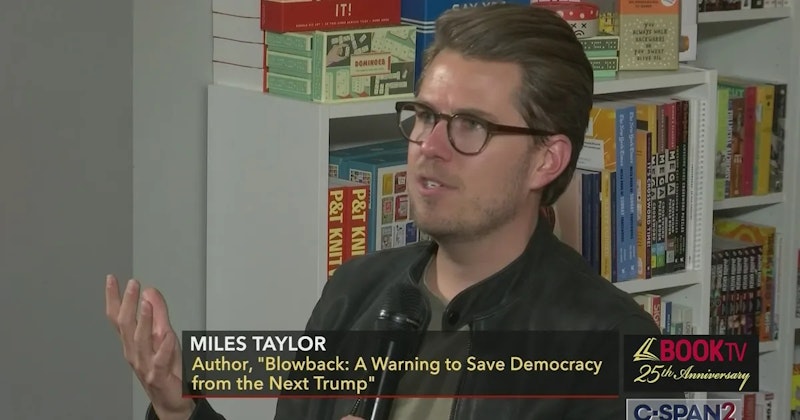Recently there’s been a drumbeat of opinion pieces warning about the ways Donald Trump is liable to abuse the power of the presidency of the United States if he wins a second term. On Monday The Dispatch published a podcast interview with Maggie Haberman about Trump’s plan to settle scores. That follows a similar podcast in The New Yorker, less than two weeks after a print piece (November 9’s “Letter From Washington”). Last Tuesday Reuters published a story looking at Trump’s promises to investigate political appointees and his political opponents. Even Joe Manchin’s on the bandwagon, stating on a press call last week that Trump “will destroy democracy in America” in a second term.
It may have all started this summer, with the publication of Blowback, by Miles Taylor. Taylor’s a former senior adviser to John Kelly, the Secretary of Homeland Security, and the author of an anonymous 2018 op-ed in The New York Times which stated that Trump was amoral and “not moored to any discernible first principles that guide his decision making.” Taylor claimed officials including himself were acting to thwart Trump’s “more misguided impulses,” and these “unsung heroes in and around the White House” were “adults in the room” who were “trying to do what’s right even when Donald Trump won’t.”
In 2019 Taylor, still anonymous, followed up with a full-length book called A Warning, in which he said things were much worse than he’d realized, and argued America couldn’t afford another term of Trump. Now there’s Blowback, an odd mix of autobiography and downbeat premonition, warning about what Trump learned in his first term and what he’ll do if he gets a second. Taylor’s a political creature and therefore not to be wholly trusted, but write 300 pages and you’re bound to say something you believe even if you don’t realize it.
Taylor’s audience in Blowback appears to be those fabled creatures, the Reasonable Centrists. Presenting himself as a conservative nostalgic for an older version of the Republican party, he distinguishes between principled Republicans who put forward policies they believed would help the United States as a whole, and Trump (and his enablers). So he praises Kelly and Kirstjen Nielsen, describing their opposition to Trump and attempts to soften the harsher aspects of his orders, casting them among the “unsung heroes” acting to rein him in.
But only a couple of weeks after Kelly hired Taylor as an adviser, Kelly defended the enforcement of Trump’s immigration policies. Nielsen spoke publicly in favor of the separation of thousands of children from their parents, though Taylor claims she secretly opposed it. You might wonder, given their willingness to put their names behind policies they allegedly despised, how effective their resistance was.
Taylor doesn’t explore the distinction between Trump and traditional Republicans in any depth. He mentions Betsy Devos in passing, portraying her as a conventional and trustworthy non-Trump Republican and stating that she considered resigning from Trump’s cabinet (which she eventually did 12 days before her term ended). Taylor doesn’t describe her policies, which include repeatedly attempting to cut funds for the Special Olympics; nor does he mention Erik Prince is her brother, though he does correctly describe Prince as a “MAGA figure.” Much is left uninvestigated.
The DeVos-Prince relationship parallels the relationship of Trumpists and the Republican party: they’re siblings. Look only at Trump, and not at the Republican Party, and you won’t understand the last few years. For Taylor, it’s as though Trump hypnotized the Republican base. He doesn’t consider the possibility that the ideals he holds might’ve led to Trump; that looking up to the Bush administration, might have always been a path with Trump at the end of it.
Taylor claims that many in the Trump administration felt it necessary to work in the administration because the alternative was worse and because they thought they could block Trump’s excesses. Resistance was clearly effective by specific people in specific circumstances—notably, after Trump lost in 2020, key officials refused to go along with his schemes to keep himself in power. But was being part of his cabinet useful resistance? A lot of people Taylor sees as responsible adults were seduced by the possibility of power, whether they realized it or not; by the desire to use an unintelligent president to get their own personal policy preferences made law.
The book ends with Taylor’s belief that he was instrumental in Biden’s 2020 victory: “Data suggested that Biden wouldn’t have won if not for moderate Republican defectors. One poll showed 8 percent of people who voted for Trump in 2016 had flipped sides, voting for Biden in 2020. Easily the margin of victory.” That’s one reading of the statistics. Another is that Trump alienated people on his own.
After devoting most of the book to describing the personal cost of his opposing Trump, touching lightly on his alcoholism, divorce and suicide attempt, Taylor concludes by turning his experiences into a feel-good story, a Hollywood saga in which he triumphs in the end. But he also warns what’ll happen if Trump wins a second term, and why it’s imperative he be stopped again. Maybe he means it. But it reads as though, like any good Hollywood screenwriter, he’s leaving room for a sequel.
Which is what Trump’s looking for, too. Taylor’s inability to examine his own ideological predispositions, and to consider how Republican attitudes may have led to Trump, undermines his warning. He doesn’t really understand what he’s afraid of.

